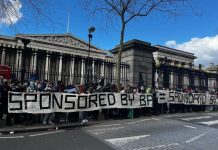East London rs21 held a meeting in May on the uprisings in Algeria, Sudan and Morocco. The speakers discussed the movements demanding change, the counter-revolutionary forces lining up against them, and the role of international solidarity.

Over the last months Sudan and Algeria have been rocked by revolutionary unrest. Inspiring protests have brought hundreds of thousands onto the streets and toppled the governments in both countries. Protesters have held strong against attempts by the military to assert control over the situation.
The revolutions in Sudan and Algeria remind us of the extraordinary power of working class struggle, and they raise vital questions about the role of imperialism in shaping the politics of these countries, especially in Algeria, where even over half a century after the war of independence successive governments have continued to bleed the countries resources into Europe, providing France with oil free of charge. Are we witnessing a new Arab Spring, and what consequences could this have for revolutionary and anti-imperialist movements around the world?
Mohamed Sameer spoke on the social bases of the uprising, the role of the Sudanese Professionals Association and the threat posed by the military forces, as well as addressing the question of whether the uprising should be understood as a continuation of the Arab spring. (The situation has developed quickly since this talk was recorded. You can read the recent statement from the Forces of Freedom and change here.)
Mohamed is one of the key organisers of the Algeria diaspora protests in London. They organise demonstrations every Saturday and you can find their Facebook page here. He argued that the movement in Algeria is a movement for dignity, and that the current state apparatus is inseparable from the colonial period.
Joe Hayns spoke on the social movements in Morocco. Socialists in Britain should be in contact with activists and trade unionists in the MENA region, for several reasons: the long history of UK interventionism, the arms trade with Saudi Arabia, and the fact that Islamophonbia and anti-Arab racism have become central to state racism.




















